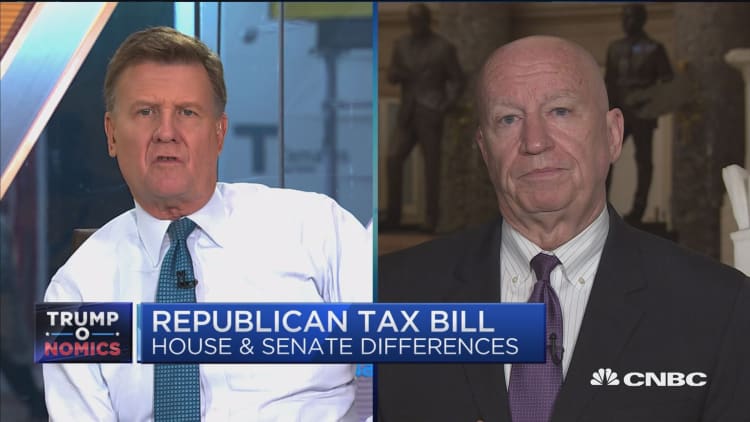
The top House tax writer said Tuesday that House and Senate Republicans will likely scrap Obamacare's individual mandate in their final tax bill.
"Yeah, I believe we will," House Ways and Means Committee Chairman Rep. Kevin Brady, R-Texas, said when asked if the joint plan would get rid of the provision requiring most Americans to have health insurance or pay a penalty.
Brady's statement appears to resolve one of the key differences between the separate tax legislation passed by the House and Senate. The Senate bill would effectively repeal the mandate, while the House proposal would not.
Brady is set to lead an expected conference committee, during which lawmakers from both chambers will try to strike a joint agreement. Brady discussed other potential sticking points in the plan during an interview on CNBC's "Squawk Box."
- In a last-minute push to pay for changes to win over GOP senators, the Senate agreed to a limited corporate alternative minimum tax, which it originally proposed to eliminate. The House plan would scrap the measure. Brady called the alternative minimum tax "costly and complex."
- Brady said he is "driving toward" a 20 percent corporate tax rate. Both bills would cut the corporate rate to 20 percent from 35 percent, but some senators pushed to make it 22 percent in order to fund different tax breaks. After repeatedly pushing for a 20 percent rate, President Donald Trump on Saturday said he would consider a 22 percent corporate rate.
- The House plan would collapse the current seven individual tax brackets into four but keeps the top rate at 39.6 percent. The Senate bill would keep seven brackets and drop the top rate to 38.5 percent. Brady said lawmakers are "trying to drive that top rate down" but did not give a hint about how they would resolve the different number of brackets.
- Brady added that House leaders are "continuing the work" to mollify Republican who represent high-tax blue states. Some of those members voted against the House bill because it would limit the popular state and local tax deductions.
The House has previously voted on its own to strike down the individual mandate.
Dropping it was initially considered politically perilous. Doing so would lead to 13 million more Americans uninsured over a decade and raise average health insurance premium prices by about 10 percent, according to estimates from the nonpartisan Congressional Budget Office.
Repealing the provision did not sink the Senate bill or alienate the three GOP senators who voted against Obamacare repeal earlier this year. Scrapping it helps Republicans to save money on a bill which, in earlier forms, would increase budget deficits by $1 trillion or more over a decade, according to the congressional scorekeeper Joint Committee on Taxation.
On Monday, House Majority Leader Kevin McCarthy also outlined where he stood on multiple possible sticking points for the bill.


